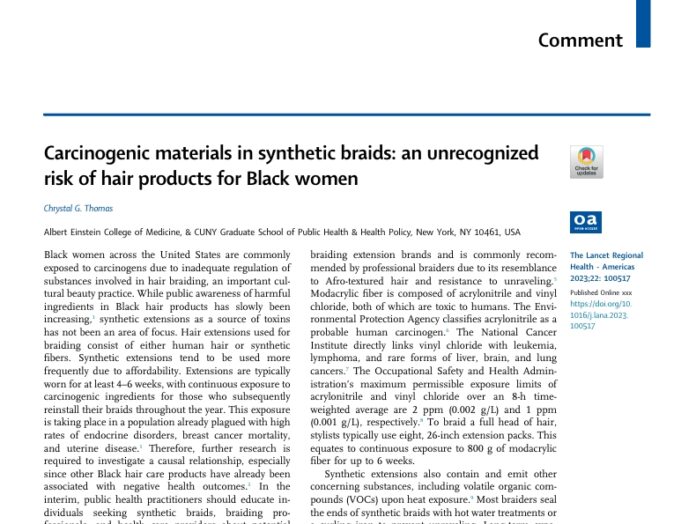Illustrative Image: June 2025: Paper of the Month by Thomas, C. G. – Synthetic braiding hair contains carcinogens like acrylonitrile and vinyl chloride, posing serious health risks to Black women: A review.
Image Source & Credit: National Library of Medicine
Ownership and Usage Policy
 A study by Thomas, C. G. (2023) titled “Carcinogenic materials in synthetic braids: an unrecognized risk of hair products for Black women” published in The Lancet Regional Health–Americas reveals that synthetic hair, particularly modacrylic fiber used in popular brands, contains acrylonitrile and vinyl chloride—both of which are known or probable carcinogens.
A study by Thomas, C. G. (2023) titled “Carcinogenic materials in synthetic braids: an unrecognized risk of hair products for Black women” published in The Lancet Regional Health–Americas reveals that synthetic hair, particularly modacrylic fiber used in popular brands, contains acrylonitrile and vinyl chloride—both of which are known or probable carcinogens.
“
Synthetic braiding hair contains carcinogens like acrylonitrile and vinyl chloride, posing serious health risks to Black women.– Thomas, C. G. 2023
This study highlights an important and often overlooked health risk associated with synthetic hair braiding extensions, especially for Black women. The author discusses how these extensions, which are commonly used due to their affordability and resemblance to natural hair, may contain carcinogenic compounds such as acrylonitrile and vinyl chloride—substances linked to various forms of cancer. The research also points out other concerns, including exposure to volatile organic compounds (VOCs) when heat is applied to synthetic hair and the presence of flame retardant fibers, which have known adverse health effects. Given the popularity of synthetic braids among Black women in the United States and Africa, the study calls for increased research, regulation of synthetic hair products, and education for both consumers and professional braiders.
What the Author Found
The study identifies acrylonitrile and vinyl chloride, both of which are known carcinogens, as components of modacrylic fiber used in popular synthetic hair brands. Acrylonitrile is classified as a probable carcinogen by the U.S. Environmental Protection Agency, while vinyl chloride has been linked to leukemia and other rare forms of cancer. The author points out that Black women who wear synthetic braids for extended periods (often 4–6 weeks or more) are repeatedly exposed to these toxic substances. Professional braiders, who work with these materials for hours at a time, may also face health risks. The study also raises concerns about volatile organic compounds (VOCs), which can be released when heat is applied to synthetic hair (e.g., through hot water sealing or curling irons). These VOCs may exacerbate respiratory issues like asthma
Why is this important
Public Health Awareness: The study exposes carcinogenic compounds like acrylonitrile and vinyl chloride, found in popular synthetic braids. These chemicals have been linked to cancer, yet many consumers remain unaware of their presence in hair products.
Consumer Safety & Regulation: Unlike cosmetics, synthetic hair extensions are poorly regulated, allowing harmful substances to enter the market without adequate scrutiny. The study calls for policy changes to establish safety standards.
Disproportionate Impact on Black Communities: Synthetic braiding hair is widely used among Black women, many of whom install braids frequently for cultural and practical reasons. The exposure risk is higher because braids are worn for weeks, leading to prolonged contact with toxic fibers.
Professional Braider Safety: Not only do consumers face risks—professional hair braiders, who handle synthetic hair daily, may experience increased exposure to harmful chemicals like VOCs (volatile organic compounds) released during styling.
Call for Further Research & Advocacy: The study urges health professionals, researchers, and policymakers to investigate the potential health effects of synthetic hair more deeply and to educate consumers about safer alternatives.
What the Authors Recommended
- The author emphasises that consumers, professional braiders, and healthcare providers should be educated about the potential exposure to carcinogenic compounds in synthetic hair.
- The study calls for stricter regulations on synthetic hair products, including bans on harmful flame retardants at the federal level, and more studies are needed to investigate the long-term health effects of synthetic hair, particularly in Black communities where usage is high.
- Standardising cosmetology training to include information on the chemical composition of synthetic hair could help reduce exposure risks for both consumers and professional braiders.
- In addition, the author emphasizes encouraging the development and use of non-toxic synthetic hair options or promoting natural hair alternatives.
In conclusion, the study by Thomas (2023) sheds light on a critical yet underrecognized health issue affecting Black women and professional hair braiders: the presence of carcinogenic compounds in synthetic braiding hair. As these products continue to be widely used for cultural, aesthetic, and economic reasons, there is an urgent need for increased awareness, regulatory oversight, and safer alternatives. Addressing this issue not only protects consumer health but also promotes environmental justice and equity in the beauty industry.
















 The African Research (AR) Index is a comprehensive scholarly directory and database focused explicitly on journal publishers that publish and disseminate African research.
The African Research (AR) Index is a comprehensive scholarly directory and database focused explicitly on journal publishers that publish and disseminate African research.

